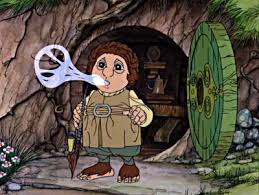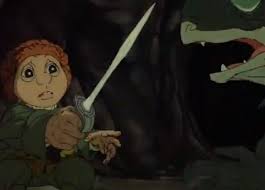As a child, the books I most frequently read were the books of the Bible and their associated commentaries and the books by J.R.R. Tolkien and their associated commentaries.
 |
| Bilbo Smoking Weed |
The former readings focused primarily on the Pentateuch and the Hebrew legends surrounding the narratives in the Pentateuch, called
Midrashim, and the latter included everything from "The Hobbit" to "The Silmarillion" to "The Shaping of Middle-Earth," a tome edited by Christopher Tolkien that centered on the maps found in the elder Tolkien's notebooks. I have always been fascinated at how closely Tolkien's stories mirror those of the Bible, particularly in the case of Abraham, Jacob, Joseph, Moses, Saul and David.
As Joseph Campbell has so effectively shown, all stories, from the Bible to The Office, draw from the same format, known as the monomyth, also known as The Hero's Journey.
 |
| Bilbo fending off Golum in a gloomy cave |
Bilbo's journey, of course, follows this format as well. A wealthy, comfortable, middle-aged man who is content to spend his days eating cakes and
smoking weed (Longbottom Leaf being particularly potent), is unwittingly thrust on an adventure in which he must become valiant and brave, and just a little bit treacherous, as all successful heroes must be in order to vanquish their foes.
I am very much excited therefore, to see Peter Jackson's interpretation of this wonderful tale as soon as it is fully released in theaters this week.



